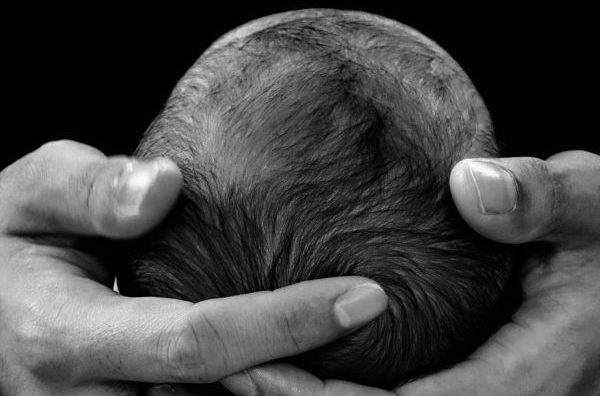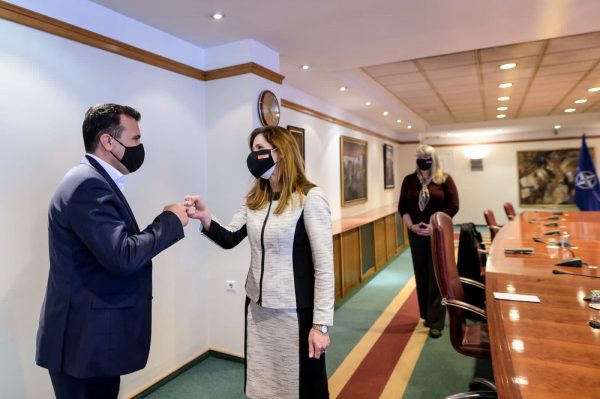The government tells MIA that 1,175 registered single parents received one-time financial aid in order to manage the crisis better. In the first part of this analysis, MIA conveyed the viewpoints of institutions and organizations in terms of the sets of measure and the problem with the law that doesn’t clearly define single parents and poverty. This part of our analysis includes a conversation with a single mother, whose name is Olivera. Through her words, we will define the full, realistic image of the position single parents are in in the country, especially when there’s a global pandemic.
Single parents who haven’t gotten any aid are handling the corona crisis worse
Olivera Gjorgjievska, a single mother, got a one-time financial aid. She said she took a voucher of MKD 3,000, which was a welcome sum of money, but it didn’t help her – especially in a crisis at a global scale.
“The money helped very little due to the conditions. It was welcome, but not enough to help me deal with the crisis,” Olivera confesses, adding that the pandemic added an additional fear to her life.
“The fear became especially intense when I lost my job. I’m scared that I won’t find work in the future because our expenses are so high, like bills and food and such,” she says.
The pandemic crisis is not the only challenge in society for this group of people. The single mother tells MIA of the stigmatization she’s had to face, as well as how she’s handled it.
“Half of society doesn’t accept me. They avoid me. There are, of course, people who understand me and who support me, giving me positive affirmation that everything will be okay and that they’re there for me, but it’s important for me to find a job so I don’t have to wait on anyone else. I tell myself I have a child to fight for, he gives me the strength to accept my reality and walk through life with my head held high,” Olivera says.
Stigmatization – the most effective tool for causing shame and humility in single parents
Over 4,000 women claim that society uses discrimination as a tool to discipline, subdue, force to obey and keep their heads low when it comes to this group of parents, One Can’s research says.
The research further showed that 90% of participants felt the need to explain themselves further, i.e. to say who discriminates them the most, saying that these things happen to them all the time.
Pachkova told MIA that the research looked for the causes that lead to maltreatment and discrimination.
“The first largest group of people who insult them are their former partners, evidenced perpetrators of abuse, some of them non-evidenced, fathers of their children, and in some cases partners with which they’ve tried to form a new community who are not the fathers of the participants’ children. Then there are also close and extended family members. The culture of violence, victim blaming, gaslighting and the unawareness of the families of a large portion of domestic violence abuse victims play a big part. This is what catapulted them in abusive partner relations, being treated in an undignified way since childhood, so if we’re talking in plain terms, abusive relationships are their natural habitat,” she said.
It’s crucial to mention that a large part of perpetrators of discrimination were employers or superiors, but a significant part said that colleagues in the same positions used the participants’ familial conditions to discriminate them due to competence, they say.
“Going deeper into this, we see where there’s a patriarchal inheritance as the #1 imperative. There’s no stronger ideology, no humanist note, progressiveness or empathy and sanity to overrule, especially like in the case of our state where politics boils over like in an express pot, under pressure, without democracy, concrete expertise, gathering sufficient data, in the style that the few, gathered around every other law, know everything there is and understand everything there is in typical Balkan fashion, going by the familiar motto of ‘if you want something done right, do it yourself’… but they’re influencing a huge group of women and children who are left wondering what happened to them while being convinced that they asked for it,” One Can says.
The ESE confirms that discrimination is present in working circles, and that the corona crisis has worsened single parents’ condition.
“Most single parents face inequality in the workplace. Due to their parental obligations, their possibilities to progress in the workspace are limited. Their condition has drastically worsened after the coronavirus’s outbreak, because they can’t work or continue working in the informal economy because they can’t put their kids in kindergartens, which insist on a confirmation slip from work with a need for physical presence in order to fulfill their work obligations,” the ESE says.
“According to our clients’ statements, we can point out that most of them, as single parents, face inequality in the workspace in terms of keeping their jobs after maternity leave, i.e. if their contract isn’t extended if it was previously based on a certain time period or if they’re reassigned to other jobs that aren’t in coordination with their work abilities. Because of this and absences from work in order to fulfill parental obligations, their possibilities to progress in the workspace are limited,” the ESE tells MIA.
In another One Can’s research from 2018, widows are the most protected group, as well as being the most pitied.
“After them, single mothers whose partners are missing, relocated etc. are next, so divorced single mothers are a little less judged than the first two categories. Mothers whose partners are in penitentiaries are judged a lot because of ‘what were they thinking’ when they picked their partners. Those who gave birth to children out of wedlock and who have conceived via IVF are the most judged groups. These last two groups break social norms and conventions, they are pioneers in terms of families so they pay the heaviest toll of judgement. To us, they are heroines who decide to build their own families regardless of the societal definition of a family, creating relationships built on love by bringing children into this cruel world, on their own. Good for them!” Pachkova says.
She adds that there are parents who bear the burden alone despite the other parent’s ability to participate. A way for this problem to be solved, according to her, is to change the law’s definition of single parents and to apply the definition from other developed countries in Europe where single parents are defined as one-parent families.
“As an organization, we are quite familiar with many cases where the burden falls on one parent despite the other parent’s ability to actively participate in the raising of the child. Despite such situations, none of the authorized institutions are taking the initiative to find a solution for this problem, although we’ve been hoping to implement the positive practices of state alimony that works very well in other countries,” One Can says.
Data from the State Statistical Office shows that the biggest number of divorced parents, as expected, is in Skopje with 594 divorced parents. Then there’s Gostivar with 94, 102 in Prilep, 93 in Strumica and 84 in Tetovo, meaning that there were 967 divorced parents in these cities alone in 2019.
The Ministry of Labor and Social Policy tells MIA that there are 1,934 single parents in the country. They add that the system only registers the single parent who uses any of their rights as a single parent.
Injustice, stigmatization and disappointment are the main reasons that prevent Olivera to leave to another country where she could have the conditions to live a decent life.
“I’d leave because single parents get a lot of help in other European countries, whereas no one really cares for single parents here. They don’t care if they’re able to live, about their living conditions, job status… I’d leave because I’m disappointed in the state, the institutions, the people… I’d leave because I’m struggling, because half of society doesn’t accept me, but there are still people who support me,” Olivera says.
According to One Can’s data, over 80% of all single parents are single mothers. There is a small number of single fathers because they get remarried and get out of being single parents that way. Pachkova believes this is so because mothers have a special bond with their children and don’t want to subject them to further life changes.
A mother’s ability for self-sacrifice goes so far as to prevent them from getting remarried so they can fully devote themselves to their children. Women are not considered a special masterpiece of nature for nothing, primarily due to their ability to create life, and then to dedicate the rest of their existence to their children.
Simona Srbinoska
translator: Dragana Knezhevikj

















